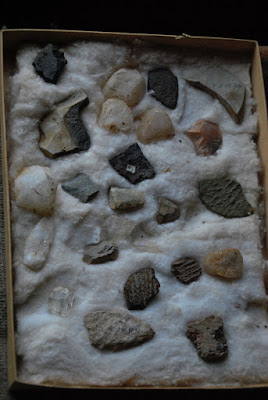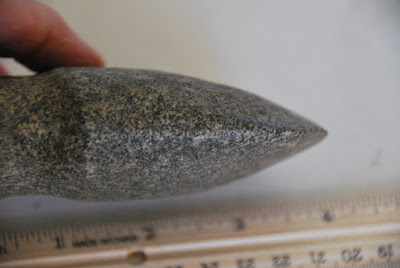Last week I took a load off my truck and off my mind. I delivered all the late Helen Leadbeater’s Indian artifacts and journals to the Maine State Museum in Augusta. The boxes I had packed up last summer filled my Toyota Tacoma. They comprised the result of thirty years of collecting and documenting Indian artifacts from the upper Saco River Valley. I was afraid my truck wasn’t big enough to fit it all in. I was also afraid all that stone weighed so much I might break a spring, but I made it.
There to greet me were Arthur Speiss, senior archaeologist at the Maine Historic Preservation Commission, and Paula Work of the Museum. When I asked Paula what was so valuable about Helen’s collection, she said there had been hardly any professional archaeological work done in my part of Maine and, though Helen wasn’t a professional, she was a very careful researcher who kept extensive records of what she found and where.
Though my tenure here in western Maine overlapped Helen’s, we never met. My sister-in-law collected with her in North Fryeburg’s fields after they were plowed and harrowed in springtime. My brother viewed the collection after being granted access by Helen’s son, Arizona Zipper, who inherited her property across from Fryeburg Academy. When I wrote about Helen’s collection in this column, AZ, as Arizona Zipper likes to be called, knocked on my door and invited me to see it as well.
That was ten years ago when I was still teaching US History in Fryeburg. Virtually every archaeologist in the northeast had made the pilgrimage to Helen’s house, and one of them, Mike Gramly, asked me to inventory the collection for him. Gramly used to head up the Maine State Museum and the IRS recognizes him as an appraiser of archaeological collections like Helen’s. So, when I retired that became my first project. AZ gave me access again and I spent three weeks that first winter of retirement photographing her artifacts the way Gramly asked me to.
 |
A local woman named Diana Bell heard about what I was doing and offered her assistance. While I photographed the artifacts box by box (Helen used hundreds of nylon stocking boxes to store them in), Diana scanned Helen’s notebooks and journals, which were also extensive. Thus I learned much about early human settlement of Fryeburg, Lovell, and Conway, New Hampshire. Helen published one scholarly article on pottery in the Maine Archaeological Society Journal in 1978.
A former student of mine named Bill Rombola had surveyed Helen’s collection during his archaeological study at the University of Southern Maine and published another article about in the journal in 1998. In it, Rombola reported that some of Helen’s artifacts were as much as 8000-9000 years old and were made from lithic (stone) material from New York, Vermont, Maine, Quebec and even northern Labrador (Ramah Chert).
AZ had little interest in his mother’s passion but he respected her work and wished to preserve it for study. His house is huge, difficult to heat and maintain, so for years he’s been considering a sale and a move to a smaller home. At one point, I was working with Dan Lee, former headmaster at Fryeburg Academy, to mediate a purchase of the home and turn part of it into a museum for Helen’t collection. AZ couldn’t pull the trigger on that so I began trying to convince him to let the Maine State Museum have the collection.
Last spring, he agreed under one condition: that photographs of Helen’s artifacts and digital copies of her journals be made available online as well as at the museum. I hurried to get his signature on a formal agreement to that effect from the museum and began to box up the collection. That occupied me last summer through some very hot, humid weeks getting it all packed and moved to a friend’s garage in Lovell. I also retrieved several boxes of artifacts that had been on loan to the Conway Library for exhibit.
 |
| Helen Leadbeater |
In Augusta last week, Art and Paula helped me unload, and Paula showed me around the museum warehouse. I was thoroughly fascinated as only a history geek could be. On its moveable shelves were every historical collection about which I had been reading for decades! At one point we passed a drawer labeled “Michaud” which I knew to be a paleoindian site in Auburn, Maine. She pulled it out and let me hold a paleo projectile point over 12 thousand years old. It was quite a thrill. I said I wished I didn’t live so far away because I could spend months there totally enthralled. She said I’d be welcome anytime.










2 comments:
Interesting! Arizona Zipper graduated in my class at Fryeburg Academy, and I knew him well. He was Randy Meader at that time. He had great love and respect for his mother.
Can you post the URL where the collection is available online, when that's available? I'd be interested in checking it out.
Post a Comment